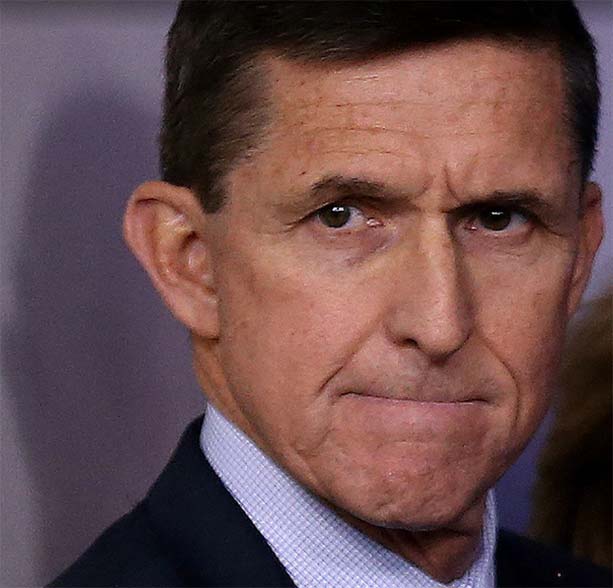 Adriana Usero for The Washington Post
Adriana Usero for The Washington Post
WASHINGTON - Michael Flynn's resignation as national security adviser is shifting the balance of power between President Donald Trump and Congress, with Republican senators vowing to more aggressively exercise oversight of the new administration and Democrats seizing an opportunity to ask pointed questions about Trump's ties to Russia.
On Wednesday, Senate Democrats convened an emergency meeting to plan their next steps in probing the circumstances that led to Flynn's departure. While significant disagreement remains among Democrats and between the parties on the path forward, Senate GOP leaders affirmed their commitment to conducting a far-reaching investigation through the Senate Intelligence Committee that is already examining allegations of Russian meddling in the 2016 elections.
"It is now readily apparent that General Flynn's resignation is not the end of the story. It is merely a beginning of a much longer story," Senate Minority Leader Charles Schumer, D-N.Y., said on the Senate floor.
Since Trump was elected, Capitol Hill Republicans have tread carefully when it comes to the new administration. They have deflected calls for probes into Trump's potential conflicts of interest related to his sprawling business interests and only recently asked for information from the White House about security protocols at Trump's Florida resort, Mar-a-Lago. But after allegations that Russia intervened in the election to favor Trump, both the House and Senate intelligence committees launched examinations.
Amid reports of contacts between Trump aides and Russian officials during the election, congressional leaders are reasserting their authority.
"You know, everybody looks at last year's election and says it was a change election," Senate Majority Leader Mitch McConnell, R-Ky., said on MSNBC's "Morning Joe." "Well, it was in the presidential race, but in the Senate races, it was not a change election."
McConnell reiterated that the Senate Intelligence Committee will take the lead in investigating Flynn, rather than an independent panel.
"I don't think we need to go through setting up a special committee," said McConnell. "But we are going to look at Russian involvement in the U.S. election. It's a significant issue."
Senate Foreign Relations Committee Chair Bob Corker, R-Tenn., agreed that "Russia's the elephant in the room."
"That's what we need to be dealing with," Corker said.
Senate Democratic leaders largely agreed with that approach Wednesday, even as some rank-and-file lawmakers said they didn't trust Republicans to conduct an evenhanded examination of their own party's White House. The majority party has broad powers to determine the course of an investigation in a Senate committee.
For Democrats, the growing controversy offered an opportunity to renew public scrutiny of Trump's relationship with Russia, an issue that has hovered over him since the campaign. But they faced their own political quandary as some voices - including party strategists outside Congress - called for the creation of an independent commission over which lawmakers, especially Republicans, would have less control.
"I'm just not convinced that Mitch McConnell is going to let the Intelligence Committee get to the real story," said Sen. Chris Murphy, D-Conn., who advocated the establishment of an independent commission.
However, Democrats conceded they did not have the support they needed for such a move - primarily, backing from McConnell - and decided to press for a full-throated investigation by Congress instead.
After meeting Wednesday, Schumer, Sen. Mark Warner, Va. - the top Democrat on the Intelligence Committee - and Sen. Dianne Feinstein, Calif. - the ranking Democrat on the Judiciary Committee - demanded a comprehensive and bipartisan investigation of Trump's ties to Russia, demanding that lawmakers be "committed to making their findings as public as possible."
Schumer had previously endorsed the idea of an independent commission. But other Democrats feared risking what precious momentum they had built for an investigation by pushing for such a move.
"We've already started this process. We're already starting to review the raw intelligence. We're well down this path," Warner told reporters Wednesday. "I think that would greatly delay the process, and what I think everyone wants, regardless of where we stand, is we want to get this done expeditiously."
Warner insisted that he has faith in Senate Intelligence Committee Chairman Richard Burr's commitment to pursue the investigation fairly, adding that, "if at any point we're not able to get the full information and we're not pursuing the information to where the intelligence leads, that we'll look at other options."
Democrats also say they want the Justice Department - specifically, the FBI - to continue investigating the allegations that Russia intervened in the 2016 election in an attempt to help Trump win. But they are insisting that Attorney General Jeff Sessions - a former senator and close Trump campaign confidant - recuse himself.
Meanwhile, Republicans - especially in the Senate - vowed a thorough investigation into Flynn's communications with Russia and other ties between the two countries. Flynn resigned Monday night following revelations that he spoke about sanctions with Russia's ambassador to the United States after the election but before Trump took office, a potential violation of the law. He also misled Trump administration officials, including Vice President Pence, about his communication.
Burr, R-N.C., promised the investigation would be wide-ranging.
"I'm not sure the Intelligence Committee has tight parameters on it. We've said we're going to go anywhere the intelligence leads," Burr said. "Once we know more about what went on, we'll make a determination."
Senate Judiciary Committee Chairman Charles Grassley, R-Iowa, and the top Democrat on the panel, Feinstein, sent Sessions and FBI Director James Comey a letter Wednesday asking for copies of transcripts of Flynn's intercepted calls as well as a committee briefing later this month on the events leading up to Flynn's resignation.
In the House, Republican leaders have been less aggressive toward Trump, raising questions about how serious the GOP as a whole is about holding him accountable. Permanent Select Committee on Intelligence Chairman Devin Nunes, R-Calif., has said he is more concerned about leaks to the news media chronicling Flynn's contact with Kremlin officials, as well as a New York Times report that several Trump campaign officials talked repeatedly with Russian officials during the election.
"Frankly, it's safer for them to talk about leaks than be critical of the president," Adam Schiff, Calif., the ranking Democrat on the House Intelligence Committee, said of his GOP colleagues. "There's still a lot they want from this president in the form of tax cuts and regulatory giveaways, so I think they're hoping to get what they can get before they have to confront him."
"All of us know that leaks happen in this town, and we all don't like it - but the fact is that you now have a much larger issue to address," said Senate Armed Services Committee Chairman John McCain, R-Ariz.
At least one Republican said lawmakers should establish a "joint select committee" - consisting of members of the House and the Senate.
"Now, was this outside the norm? Was this something damaging to the country?" Sen. Lindsey Graham, R-S.C., said in a Fox News Channel interview Wednesday. "I don't know, but if there were contacts between Russian officials and Trump campaign operatives that [were] inappropriate, then it would be time for the Congress to form a joint select commission to get to the bottom of all things Russia and Trump."
Democrats are insisting on some ground rules for the investigations, which could take place in multiple panels.
They are demanding that the Trump administration preserve all its records from the transition period, citing "real concern" that officials might "try to cover up ties to Russia" by deleting emails, texts and other documents establishing links between the Trump White House and the Kremlin, Schumer said. Democrats also want Flynn, former Trump campaign manager Paul Manafort and other campaign officials to make themselves available to testify.
Republicans have yet to sign off on such demands. But even senators in the president's own party recognize that Congress has a responsibility to act.
"The national security adviser lied to the vice president of the United States," McCain said. "That's a pretty serious event."
Previously:
• 02/09/17: GOP Senate troika looks to assert itself on Russia, Trump be damned
• 06/10/16: House's top military Republican would bring back threat of torture
• 06/09/16: Paul Ryan lays out GOP's national security agenda, softening Trump's edges
• 04/25/16: GOP prepares measures taking aim at the heart of the Obama administration's national security structure
• 01/08/16: Dems, frustrated with Obama on Iran, float new sanctions proposals
• 03/17/16: What about the visa waiver program? Lawmakers warn it poses even greater terrorist threat than refugee admissions



 Contact The Editor
Contact The Editor
 Articles By This Author
Articles By This Author